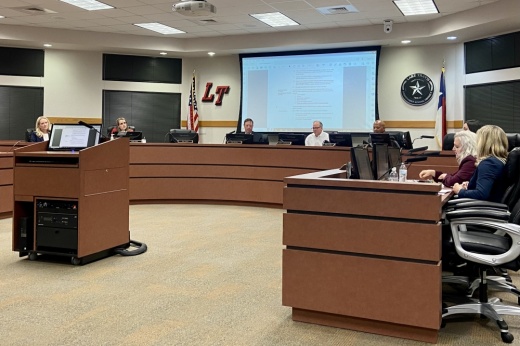The efforts come after two Lake Travis High School students placed peanuts in the locker of a student with a peanut allergy in the fall—an incident the district determined was not bullying, a district official told Community Impact.
Current situation
LTISD officials reviewed updates to the district’s food allergy management plan that were made in January for the first time in four years at a Feb. 21 board of trustees meeting.
The plan, which was implemented in 2018, is intended to better support and reduce exposure to common food allergies for students at risk for anaphylaxis, according to district documents.
Under the updated plan, every student with a severe food allergy will now be referred for a 504 consideration, which provides protections for students with disabilities. Previously, nurses reviewed student information before making the determination, said Tasha Barker, LTISD assistant superintendent of organizational services.
The district also made the following changes to the food allergy management plan:
- Elementary classes with students with severe food allergies will always eat lunch in the cafeteria, even on early release days.
- Exceptions can no longer be made with principal approval to the district’s elementary school food allergy policy.
- A food and nutrition services representative will now serve on a campus’ food allergy management team.
- Parents must make requests in writing before the beginning of each school year if they seek to opt out of “standard allergy precautions,” including classroom signage, cafeteria seating and other students limiting food allergens.
Following a recent review of the plan, the district will post new food allergy awareness posters in campus cafeterias and information about the importance of hand washing to avoid cross contamination at elementary schools, Barker said.
Additionally, every classroom in the district will have a document for teachers detailing the signs of anaphylaxis before the end of this school year.
The district will also begin providing training to help students with food allergies transition from elementary to secondary school in May of each school year, she said.
What board members are saying
Place 1 board member Phillip Davis expressed concerns about how the district will respond when the food allergy management plan is violated.
“What happens when the plan is not followed or adhered to? What are the possible repercussions of someone not following the plan?” Davis said. “I think that needs to be very clear.”
Some board members requested that all district staff be trained to administer epinephrine to students. Place 2 board member Lauren White recommended the district implement a food allergy awareness curriculum.
How we got here
At a Nov. 15 board of trustees meeting, LTISD parent Shawna Mannon said two of her son’s teammates on the Lake Travis High School varsity football team placed peanuts in his athletic locker, cleats and uniform after learning her son had a life-threatening peanut allergy.
While district officials said they could not share how the students were disciplined due to federal privacy laws protecting minors, Mannon said she believed the students were given minimal consequences.
A district investigation into the incident found that “legal elements of bullying were not met,” as state law defines bullying as “an act or pattern of acts that physically harms a student or materially and substantially disrupts the educational process,” said Marco Alvarado, LTISD executive director of communications and community relations.
The district did not investigate the situation as a bullying incident until after a parent of one of the involved students reported it in November, he said.
The district’s police department determined the incident did not warrant criminal charges after consulting the Assistant District Attorney’s Office and the Travis County Attorney’s Office, and closed the case on Dec. 6, Alvarado said.
On Feb. 1, the Texas Education Agency concluded a review on the incident and “determined that the district had addressed all concerns with regard to potential bullying and food allergy compliance, and found no violations of law or policy,” he said.
Mannon has filed a grievance with the district that is currently pending, Alvarado said.
Going forward
Following the incident, the district began showing a video to high school students intended to “improve peer food allergy education and management” that middle school students will view in May, district officials said.
The district is also planning assemblies for elementary school campuses later this spring as well as an event for parents and community members, Alvarado said.





